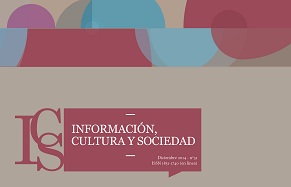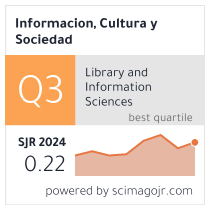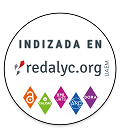Bibliotecas Humanas. Revisión sistemática de su concepción e implementación en el ámbito educativo
Resumen
La necesidad de cultivar ambientes inclusivos y participativos en los centros escolares justifica la implementación de estrategias como las Bibliotecas Humanas (BH), espacios en donde personas reales, denominadas “libros humanos”, comparten sus experiencias y perspectivas, promoviendo así la empatía y el diálogo. En esta revisión sistemática de literatura, realizada según el protocolo PRISMA, se analiza la producción científica que aborda la implementación de las BH en el ámbito educativo. La búsqueda comprende de enero de 2000 a enero de 2024 y fue realizada en las bases de datos Web of Science (Wos), Scopus, ERIC, Dialnet y el motor de búsqueda de Google Scholar. La presente revisión responde a siete preguntas de investigación, agrupadas en cuatro dimensiones: concepción de la BH en el contexto educativo y beneficios, objeto de estudio y participantes, proceso de implementación y recomendaciones, desafíos y futuras líneas de investigación. Entre los hallazgos se destaca que las BH, además de su función educativa y su capacidad para contrarrestar prejuicios y fomentar la conexión humana, se posicionan como un método innovador asociado a la investigación narrativa. Con ello, se busca ofrecer oportunidades para abordar futuras intervenciones e investigaciones que garanticen la construcción de ambientes educativos libres de violencia. ARK CAICYT: http://id.caicyt.gov.ar/ark:/s18511740/mlk8lpldqDescargas
Citas
Abergel Ronni, Antje Rothermund, Gavan Titley y Wootsch Péter. 2005. Don’t judge a book by its cover! The living library organiser’s guide. Budapest: Council of Europe Publishing.
Aguiar, Vicente, Kelly Almeida-De-Oliveira y Rossini Pereira-Maduro. 2023. A educação e as corporeidades: As resistências nas existências. En Educación y Contemporaneidad. Vol. 32, no. 72, 351-369. <https://doi.org/10.21879/faeeba2358-0194.2023.v32.n72.p351-369>
Béres, Judit y Dóra Egervári. 2018. Read (Each)Other! The living library initiative at the University of Pécs. En Paideia. Vol. 6, no. 1, 7-16. <https://doi.org/10.33034/paideia.2018.6.1.7>
Blizzard, Kara, Yvonne Becker y Nancy Goebel. 2018. Bringing women’s studies to life: Integrating a human library into Augustana’s women’s studies curriculum. En College Quarterly. Vol. 21, no. 3, 1-18. <https://files.eric.ed.gov/fulltext/EJ1203529.pdf> [Consulta: 25 enero 2024].
Bryan, Jane y Kerry Dobbins. 2023. Food for the soul: Applying the human library concept to academic professional development. En Journal of Perspectives in Applied Academic Practice. Vol. 11, no. 2, 24-29. <https://doi.org/10.56433/jpaap.v11i2.526>
Boboňová, Ivana, Izabela Kurtek, Alexandra Škodová, Ľudmilla Galuščáková y Ľubomír Rybanský. 2020. Human libraries: The power of using stories in education. En Edulearn 20: 12th International Conference on Education and New Learning Technologies. Proceedings. Vol. 1. 4660-4667. <https://doi.org/10.21125/edulearn.2020.1227>
Bordonaro, Karen. 2020. The human library: Reframing library work with international students. En Journal of Library Administration. Vol. 60, no. 1, 97-108. <https://doi.org/10.1080/01930826.2019.1685271>
Brown, Deborah. 2016. School libraries as power-houses of empathy: People for loan in the human library. En IASL Conference Proceedings. Vol. 1. 35-46. <https://doi.org/10.29173/iasl7197>
Chang, Hsiao-Yun, Wen-Yun Tsai y Ya-Ling Huang. 2024. Dialogues with human books to promote professional commitment and learning among first-year nursing students: A mixed-methods study. En Nurse Education Today. Vol. 132, 106010. <https://doi.org/10.1016/j.nedt.2023.106010>
Dobreski, Brian y Yun Huang. 2016. The joy of being a book: Benefits of participation in the human library. En ASIS&T Proceedings of the Association for Information Science and Technology. Vol. 53, no. 1, 1-3. <https://doi.org/10.1002/pra2.2016.14505301139>
Fahed, Ziad. 2020. Teaching spiritual solidarity through “Human Books”. En Teaching Theology & Religion. Vol. 23, no. 3, 202-208. <https://doi.org/10.1111/teth.12551>
Giesler, Mark. 2021. Humanizing oppression: The value of the human library experience in social work education. En Journal of Social Work Education. Vol. 58, no. 2, 390–402. <https://doi.org/10.1080/10437797.2021.1885541>
Gómez Gómez, Elba Noemí. 2020. La historia oral. Una metodología de los excluidos. En Cambios y Permanencias. Vol. 11, no. 2, 1372-1394. <https://revistas.uis.edu.co/index.php/revistacyp/article/view/11756> [Consulta: 24 enero 2024].
Kudo, Kazuhiro, Yuri Motohashi, Yuki Enomoto, Yuki Kataoka y Yusaku Yajima. 2011. Bridging differences through dialogue: Preliminary findings of the outcomes of the human library in a university setting. En Proceedings of the 2011 Shanghai International Conference on Social Science (SICSS). (17-20 Agosto 2011: Shanghai). Shanghai, China: Crowne Plaza Shanghai Fudan. <https://acortar.link/4jhr0A> [Consulta: 22 enero 2024].
Kwan, Chi-Kin. 2020. A qualitative inquiry into the human library approach: Facilitating social inclusion and promoting recovery. En International Journal of Environmental Research and Public Health. Vol. 17, no. 9, 3029.
<https://doi.org/10.3390/ijerph17093029>
Lam, Gary Yu Hin, Hei Ting Wong y Mengge Zhang. 2023. A systematic narrative review of implementation, processes, and outcomes of human library. En International Journal of Environmental Research and Public Health. Vol. 20, no. 3, 2485. <https://doi.org/10.3390/ijerph20032485>
Latorre, Antonio. 2005. La investigación-acción. Conocer y cambiar la práctica educativa. Barcelona: Graó.
Lorenzano Schifrin, Sandra. 2022. Bibliotecas, género e inclusión. En Biblioteca Universitaria. Vol. 25, no. 1. <http://doi.org/10.22201/dgbsdi.0187750xp.2022.1.1452>
Malhi, Rebecca, Grace Perez, Javeria Shafiq y Aaron Johnston. 2023. Practical tips for using a human library approach in medical education. En MedEdPublish. Vol. 13, 208-215. <https://doi.org/10.12688/mep.19746.1>
Micheletti, Stefano, Sandra Vera y Javiera Cubillos Almendra. 2018. La biblioteca humana migrante: Uso del espacio público y resignificación del proceso migratorio. En Si Somos Americanos. Vol. 18, no. 2, 53-77.
<https://doi.org/10.4067/S0719-09482018000200053>
Monroy Flórez, Gloria Inés. 2023. Bibliotecas Humanas de la Vereda Montañuela en Copacabana – Antioquia: Mujeres campesinas mediadoras del conocimiento tradicional en la escuela rural. Barranquilla: Universidad de Antioquia. 101 p. Tesis de Maestría. <https://acortar.link/7mQDhZ> [Consulta: 22 de enero 2024]
Naik, Kasturi. 2020. Role of “human library intervention” in creating awareness of diversity and inclusion. En Psychology and Education. Vol. 57, no. 9, 7125-7130. <https://doi.org/10.17762/pae.v57i9.4580>
Page, Matthew, Joanne Mckenzie, Patrick Bossuyt, Isabelle Boutron, Tammy Hoffmann, Cynthia Mulrow, Larissa Shamseer, Jennifer Tetzlaff, Eli Akl, Sue Brennan, Roger Chou, Julie Glanville, Jeremy Grimshaw, Asbjørn Hróbjartsson, Manoj Lalu, Tianjing Li, Elizabeth Loder, Eva Mayo-Wilson, Steve McDonald, Luke McGuiness, Lesley Stewart, James Thomas, Andrea Tricco, Vivian Welch, Penny Whiting y David Moher. 2021. Declaración PRISMA 2020: una guía actualizada para la publicación de revisiones sistemáticas. En Revista Española de Cardiología. Vol. 74, no. 9, 790-799. <https://doi.org/10.1016/j.recesp.2021.06.016>
Pardasani, Rahul y William Rivera. 2017. Human library: An anti-oppressive tool. Implementation guidelines for a Human Library. Pori, Finlandia: Diaconia University of Applied Sciences. 53 p. Tesis de Maestría. <https://acortar.link/Vj3unO> [Consulta: 24 enero 2024].
Pope, Kerry. 2021a. Walking a mile in their shoes: empowering learners through a human library! En IASL Annual Conference Proceedings. Vol. 1. 657-664. <https://doi.org/10.29173/iasl8309>
Pope, Kerry. 2021b. You can’t judge a book by its cover! En IASL Annual Conference Proceedings. Vol. 1. 791-805. <https://doi.org/10.29173/iasl7828>
Ramírez-Montoya, María-Soledad y Jairo Lugo-Ocando. 2020. Systematic review of mixed methods in the framework of educational innovation. En Comunicar. Vol. 18, no. 65, 9-20. <https://doi.org/10.3916/C65-2020-01>
Safdar, Muhammad, Nadeem Siddique y Muhammad-Ajmal Khan. 2024. A systematic review of literature on human libraries: Objectives, benefits, and challenges. En Journal of Librarianship and Information Science. Vol. 53, no. 3, 785-795. <https://doi.org/10.1177/09610006231155886>
Schijf, Candy-May, Julieta Olivar, Jorge Bundalian y Marian Ramos-Eclevia. 2020. Conversations with human books: promoting respectful dialogue, diversity, and empathy among grade and high school students. En Journal of the Australian Library and Information Association. Vol. 69, no. 3, 390-408. <https://doi.org/10.1080/24750158.2020.1799701>
Sen, Robin, Nora McClelland y Beverley Jowett. 2019. Belonging to the library: Humanising the space for social work education. En McLaughlin, Hugh, Joe Duffy, Brendan Mckeever y June Sadd, eds. Service User Involvement in Social Work Education. Londres: Routledge. p. 33-45. <https://doi.org/10.4324/9781351232630-5>
Sierra Martínez, Silvia, María Fiuza Asorey y Ángeles Parrilla. 2019. Investigación participativa con jóvenes con discapacidad visual: cuando los relatos de exclusión e inclusión salen a la calle. En Revista Internacional de Educación Para La Justicia Social. Vol. 8, no. 2, 49-69. <https://doi.org/10.15366/riejs2019.8.2.003>
Soy Bibliotecario. 2016. Biblioteca humana: El tejido de la trama. En Soy bibliotecario Blogspot. <https://soybibliotecario.blogspot.com/2016/10/biblioteca-humana-el-tejido-de-la-trama.html> [Consulta: 13 julio 2024].
Stewart, Kristine y Benjamin Richardson. 2011. Libraries by the people, for the people: living libraries and their potential to enhance social justice. En Information, Society and Justice. Vol. 4, no. 2, 83-92. <https://acortar.link/I14i17> [Consulta: 23 enero 2024]
Suárez, Daniel. 2021. Investigación narrativa, relatos de experiencia y revitalización del saber pedagógico. En Espacios en blanco. Revista de Educación. Vol. 2, no. 31, 365-379. <https://ojs2.fch.unicen.edu.ar/ojs-3.1.0/index.php/espacios-en-blanco/article/view/1075> [Consulta: 23 enero 2024]
Tian, Liu. 2014. Human library and its application in college students’ ideological and political education innovation mode. En Proceedings of the 2014 International Conference on Mechatronics, Electronic, Industrial and Control Engineering. (15-17 noviembre 2014: Shenyang). Shenyang, China: MEIC. p. 1689-1692. <https://doi.org/10.2991/meic-14.2014.380>
Universidad Veracruzana. Coordinación de la Unidad de Género. 2023. Biblioteca Humana 2023. <https://www.uv.mx/uge/general/biblioteca-humana-2023/> [Consulta: 13 julio 2024].
Yamashita, Miki. 2016. Enhancing studentsʼ generic skills through active learning and mentoring: a qualitative study of the effectiveness of a human library project. En Reitaku Journal of Interdisciplinary Studies. No. 24, 93-105. <https://doi.org/10.18901/00000652>
Yap, Joseph Marmol, Donna Lyn Gloriane Labangon y May Laureno Cajes. 2017. Defining, understanding and promoting cultural diversity through the human library program. En Pakistan Journal of Information Management and Libraries. No. 19, 1-12. <https://doi.org/10.47657/2017191012>
Datos de Investigación
Rojas-Estrada, Elizabeth-Guadalupe .2024. Material suplementario BH. figshare. Dataset. <https://doi.org/10.6084/m9.figshare.25330465.v1>
Los autores/as que publiquen en esta revista aceptan las siguientes condiciones:
- Los autores/as conservan los derechos de autor y ceden a la revista el derecho de la primera publicación, con el trabajo registrado con la Licencia Creative Commons Atribución-CompartirIgual 4.0 Internacional, que permite a terceros utilizar lo publicado siempre que mencionen la autoría del trabajo y a la primera publicación en esta revista.
- Los autores/as pueden realizar otros acuerdos contractuales independientes y adicionales para la distribución no exclusiva de la versión del artículo publicado en esta revista (p. ej., incluirlo en un repositorio institucional o publicarlo en un libro) siempre que indiquen claramente que el trabajo se publicó por primera vez en esta revista.
- Se permite y recomienda a los autores/as a publicar su trabajo en Internet (por ejemplo en páginas institucionales o personales).


























